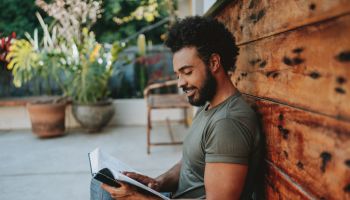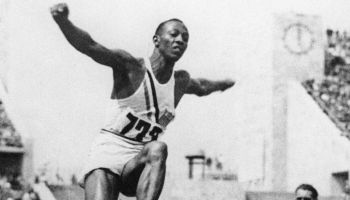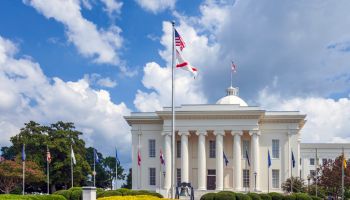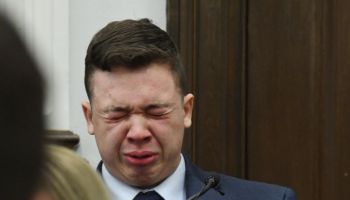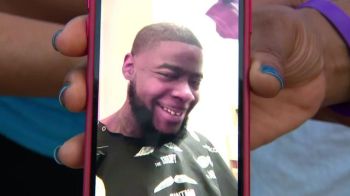Is the pulpit brain-washing blacks against supporting Lesbian, Gay, Bi-sexual and Transgendered (LGBT) people?
SEE ALSO: Father Says It Was ‘A Mistake’ To Use 9-year-old As Chauffeur
It depends on who you ask. LGBT advocates have different perspectives on why blacks do not align themselves with gay rights causes. To varying degrees, many LGBT rights advocates say that the church is the singlemost influential factor in black opinion on homosexuality.
Antonio David Garcia, executive director of Affirmations, a Detroit-area LGBT civil rights group, says what’s worse is that those opinions are often homophobic and go unchallenged.
“Everyday we face religious bigotry [from the church],” Garcia says. “They’ve got to start questioning some of the stuff they’re hearing from the pulpit. Dr. King made that very clear in what he talked about as the soft mindedness of sheep being followed by the priest.”
Want to Keep Up With NewsOne.com? LIKE Us On Facebook!
More than 80 percent of African Americans consider themselves to have some religious believes with at least half of them attending church activities on a weekly basis, according to the Pew Research Center. Additionally, nearly 50 percent of African Americans are against same-sex marriage and have overwhelmingly supported state bans on marriage equality whenever such measures have come before voters.
Almost all of these voters cite their religion as the reason why they cast their ballots in favor of the bans.
That more than half of African Americans in California voted for Barack Obama while overwhelmingly supporting Proposition 8 — a measure that successfully banned gay marriage in the state in 2008 — reveals just how distinct blacks feel the two issues of black progress and gay progress are.
Some LGBT advocates say the black church is so interwoven in the fabric of the African American psyche that convincing black Americans that religion has nothing to do with homosexuality will be a futile endeavor. Black people and the church are “inextricably linked,” says Pastor Joseph Tolton of Rehodoth Temple Christ Conscious Church in Harlem.
“The church still has so much influence and they continue to use influence in a negative way,” Pastor Tolton says. “So that you’ve got people being driven further and further into the closet.
But other activists, like Sharon Lettman-Hicks, Executive Director and CEO of the National Black Justice Coalition in Washington, D.C., prefers taking the emphasis off of religion because, she says, faith has nothing to do with ensuring every American has equal protection under the law.
“At the end of the day, discriminating against LGBT people because of your own social prejudice is just wrong,” says Sharon Lettman-Hicks.
“One thing people have to realize is that LGBT black people are black people too,” says Sharon Lettman-Hicks. “When we look at the conversation of resistance in the African American community, we have to look at in context.”
That context, some LGBT advocates say, encompasses issues that have nothing to with homosexuality at all.
Pastor Tolton mentioned how black women can be manipulable by conservative interpretations of the Bible. For example, many black women in America find it daunting to find black man with whom they they share the “trifecta” of intellectual, emotional and financial security.
Sixty-seven percent of black women are college graduates as compared to just thirty-seven percent of black men. Additionally, as black women move through graduate school and join the professional ranks, their chances of finding a black man plummets even further.
Add to the mix the perceived fear that more black men will be lost to homosexuality if women do not oppose gay rights in the pews and at the ballot box, a black woman may be less inclined to lend her support to a cause she may feel drains her already dwindling mating pool.
“You’ve got single black women doing very well, who for every one black man with a graduate degree in this country, has five black women,” says Pastor Joseph Tolton. “You’ve got that whole class of 35 and 40-year-old women who are well-educated and cannot find a black man. So you’ve got that population that’s frightened.”
Wilhelmina Perry, a facilitator of Faith Leaders of African Descent, an organization of openly LGBT people of faith and clergy, says she and members of her organization are working to curb that fear in the African American community by simply being openly LGBT. Perry understands that not everyone has the security and self-assurance to reveal their sexuality, but she feels being open about themselves is essential to showing straight blacks that they are just like everyone else.
“If we aren’t visible in our communities, then the issue of human rights or the issue of civil rights just never gets raised because there is nobody there raising them,” Perry says.
“It’s important to become visible with your family and your community and your church community. It is important that they see us.”
Garcia agrees.
“Many African American and Latino men are on the DL and are not out and open,” Garcia says. “And that is, as Harvey Milk would say, is the most important thing. Once they come out of the closet those families that those people belong to are forced to make a decision. Not an intellectual decision but an emotional decision. Its one thing to say I don’t like gay people. It’s another thing to say I don’t like my son or my uncle Jim.”
Detroit, where eight-two percent of the population is black, gives Garcia a unique perspective on how blacks perceive LGBT issues. He believes that education is one of the major issues that keeps black Amercans from realizing how closely tied they are to LGBT rights. He mentions Langston Hughes and Alec Baldwin as great African American figures who lead mostly closeted lives. Then he mentions the black gay man who kept the March on Washington “straight.”
“Bayard Rustin was the architect of the March on Washington and a good friend of Dr. King’s,” Garcia said. “Bayard Rustin was a gay, black man. Nobody’s taught that in church and nobody is taught that in their public schools . He’s a Civil Rights icon that nobody knows much about unless you studied this stuff.”
But despite how resistant blacks are to joining LGBT causes, there are signs of hope.
Detroiters elected elected Charles Pugh, an openly gay television reporter, to the Detroit City Council in 2009. It was an unheard of milestone in a city that boasts a robust, black church lobby.
A number of clergymen objected to Pugh’s sexuality in private, but private is how those objections remained.
“People have whispered things about Charles Pugh’s homosexuality that they wouldn’t dare say in public, partly because they don’t want to be singled out,” Mildred Gaddis said during a 2009 interview with Time magazine.
In Washington D.C., another bastion of African American culture and political might, its City Council passed a same-sex marriage bill 11-2. The one of the two bailouts: Marion Barry.
Lettman-Hicks says people should not be surprised by this result and says one consideration many observers of D.C.’s LGBT movement overlook is that the District has a large African American LGBT community.
“[D.C.] is a very evolved city,” Lettman-Hicks says. “We have a very organized movement of self-empowered people within the black and LGBT communities who were got going to be denied their rights.”
“Marriage, in terms of how we pursue marriage equality, is going down to the court house, taking out a license and being able to say that you want to legally bound your life to someone,” Lettman-Hicks says. “Anything else above that the church can do whatever they want. If the church doesn’t agree with it that’s their business.”
Lettman-Hicks has a final word for black folks who interpret the Bible and religion too literally.
“There were people who said that, as black people, we should remain slaves,” she argued. “There were people who said that women should not have a voice or be in the pulpit. And the Bible says that you shouldn’t eat shell fish so, at the end of the day, black people should stop eating crab and shrimp and then I can hear you.”
SEE ALSO:









